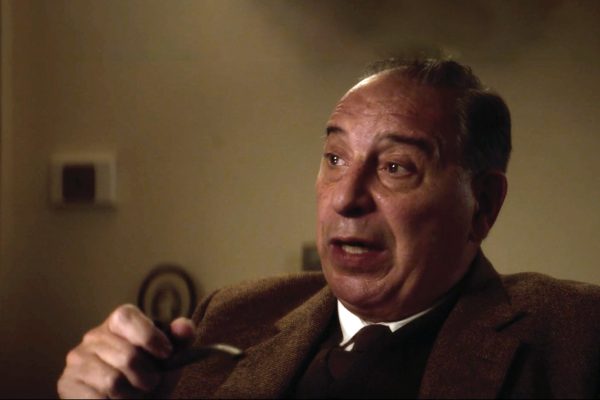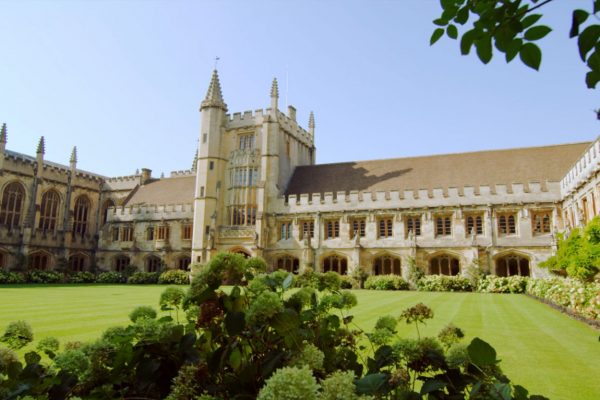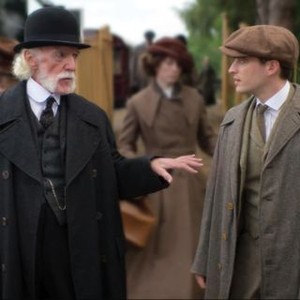Review: The Most Reluctant Convert
The Most Reluctant Convert: The Untold Story of C.S. Lewis (2021) directed by Norman Stone and starring Max McLean, is a biopic of C.S. Lewis based on the one-man stage play of the same name by Max McLean, which in turn is based on Lewis’ memoir Surprised by Joy.
The title comes from a quote found in Surprised by Joy:
That which I greatly feared had at last come upon me. In the Trinity Term of 1929 I gave in, and admitted that God was God, and knelt and prayed: perhaps, that night, the most dejected and reluctant convert in all England.
And the film is the story of how he came to this point.
The subtitle is oddly incorrect, as this story has been told before, and by C.S. Lewis. The Most Reluctant Convert tells only those events with a direct bearing on his conversion story. This leaves out a very great deal indeed of C.S. Lewis’ biography. For example, in this film there is no mention of his horrid boarding school life, his writing career, or marriage, no mention of the meetings of the Inklings.
Be that as it may, a conversion story is like a love story, or, rather, it is a love story, but one where the suitor is God and the lost soul is the beloved, and it is fitting to end when the beloved is won. So it is here: the final scene, the final word, is when Lewis takes the Eucharist in his teeth.
Since it was based on a one-man play, that is, based on an hour-long monologue, the film is mostly narration by Max McLean portraying C.S. Lewis, with only brief scenes of dialog from characters in his life, as his father or brother, or Owen Barfield, J.R.R. Tolkien, Hugo Dyson.
But do not suppose that an hour-long monologue cannot hold the viewer enraptured and charmed. Max McLean does a masterful job of capturing the wit and wisdom of Lewis using his very words.
The paragraphs come from several sources and letters, but the editing is seamless: the dialog comes across as a natural and easy. As best I can tell, no real events of Lewis’ life were altered for the sake of storytelling, as is the common practice.
The monologue is like sitting down with Jack Lewis at the Bird and Baby pub, mug in hand, and hearing him muse about his young life and his change of heart — no fan of Lewis would pass up the opportunity for such a talk, would he?

As for the acting, anyone comparing recording of the real Lewis with McLean’s perfect reflection of his tone and accent will be hard pressed to say which is which. The filmmakers took great care to preserve and mimic the look and spirit of the originals.

The cinematography used to illustrate this talk is breathtakingly beautiful, and even those who have never been to England will be smitten with nostalgia for cottages and little houses, tree-lined lanes and hedgerows, railway stations and stately halls of Oxford in the Edwardian days, and after the Great War.

Perhaps “nostalgia” is not the correct word to describe an inconsolable longing provoked by beauty as poignant as grief for places never visited, forever beyond reach. C.S. Lewis would know the correct word, or import a German term, to express it.

The difficulty of dramatizing a lifelong internal struggle over a spiritual matter is nicely overcome in this in monologue because of its candor, directness, clarity, and in the use of the important people and events in the life of Lewis.

The brief depiction of his oratorical father, with whom Lewis had a complex and difficult relationship, or the brilliant tutorship of the harshly rational W. T. Kirkpatrick “The Great Knock”, whose influence on Lewis was profound, beneficent, and lifelong, makes these men leap to life on the screen, and into the viewer’s hearts.

Drawbacks are few or none to be found. Some might wonder that the framing sequence bookending the film involves showing the actors preparing or the film crew behind the scenes. It is an odd and ungainly flourish.
Other little narrative flourishes, on the other hand, were more adroit and charming. For example, having older Lewis (Max McLean) stroll through the scene where younger Lewis (Nicholas Ralph) is in the midst of things, to comment on the action, as a man would remark about a reminiscent memory, was visually clever and clear.

Or, as another example, when Lewis in a pub turns to the audience and offers to share a pint of bitters while telling his tale, was not only visually clever, it was enchanting, and captured the whole intimate spirit of the film.
The film itself captures, or, at least, echoes, something of the character of the higher spiritual reality C.S. Lewis and J.R.R. Tolkien discussed along Addison’s Walk in the grounds of Magdalen College: it is both true and myth.

